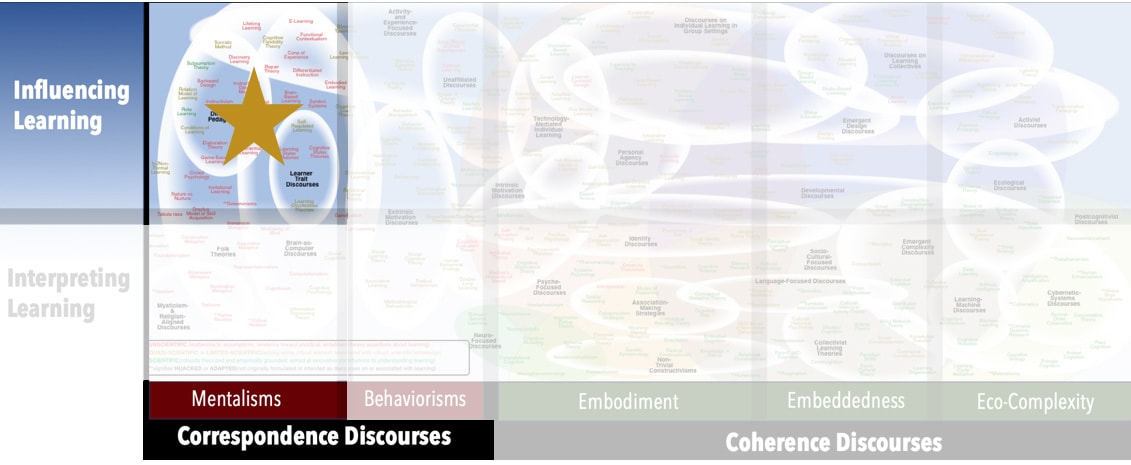AKA
Mental Load
Focus
Optimizing learning by managing the structure and flow of informationPrincipal Metaphors
- Knowledge is … informational mass
- Knowing is … using information
- Learner is … an information processor (individual)
- Learning is … change in long-term memory
- Teaching is … transmission (of information)
Originated
1980sSynopsis
Cognitive Load Theory begins by asserting that teaching can be made more effective by attending to the role and limits of working memory. Aligned with Information Processing Theory, this discourse assumes that information must be processed by working memory before it can be stored in long-term memory. Three types of cognitive load are identified:- Intrinsic Cognitive Load (Intrinsic Load) – demands placed on working memory due to the inherent difficulty of the concepts under study. Intrinsic Cognitive Load is immutable, simply because some concepts are more complicated than others.
- Germane Cognitive Load (Germane Load) – demands on working memory by elements necessary to learn the concepts under study. Germane Cognitive Load is manipulatable, as the teacher can structure experiences to manage processing and storage demands.
- Extraneous Cognitive Load (Extraneous Load) – demands placed on working memory due to unnecessary elements that might be introduced as the concepts under study are presented. Extraneous Cognitive Load is managed by removing distracting elements from instructional materials and other situational factors.
- Overload – exceeding one’s capacity to deal effectively with the task at hand. Sources/type of Overload in the psychological literature include:
- Attention Overload – a situation in which one is compelled to attend to multiple sources of information, potentially making it impossible to attend sufficiently to any
- Cognitive Overload (Mental Overload) – a mental state in which the demands on one’s thinking exceed one’s immediate coping abilities
- Communication Overload – a condition in which one is presented with more information that one can effectively accommodate or use
- Information Overload – a mental state, typically marked by anxiety or poor decision making, that is triggered by amounts, intensities, or varieties of information that exceed one’s immediate processing capacities
- Sensory Overload – a mental state of being overwhelmed by stimuli, typically marked by an inability to notice, process, or respond adequately or appropriately
- Stimulus Overload – a mental condition triggered by too many and/or too varied stimuli, typically manifest as agitation, stress, and/or frantic efforts to reduce stimulation
- Underload (Cognitive Underload; Mental Underload) – the prompting of a sort of distress that manifests as boredom, frustration, or fatigue, owing to task that lacks appropriate challenge
- Cognitive Overhead (tech industry, 1990s) – the mental effort required to understand, process, and manage information while performing a task, especially in complex or unfamiliar environments
- Environmental Load Theory – the suggestion that the central nervous system will ignore inputs when stimulations exceed a critical threshold
- Learning Shock (Dorothy Griffiths, Diana Winstanley, 2010s) – the negative emotions (e.g., confusion, anxiety, frustration) that may be triggered when experiencing excessive, unfamiliar, ambiguous, and/or unpredictable events in an educational context
- Redundancy Effect (John Sweller, 1990s) – when learning is impaired because the learner is confronted with the same information in either multiple formats or in varying levels of detail
- Seductive Details (Fictitious Inducements to Attention) (John Dewey, 1910s) – irrelevant adornments (e.g., contextualization, illustrations, animations, sound) that are added to lessons and learning tasks in efforts to make them more engaging. While sometimes motivating to learners, Seductive Details have been associated with poorer retention, diminished transfer, and reduced attentiveness.
- Split-Attention Effect (Split-Attention Principle) (John Sweller, 1990s) – the observation that Cognitive Load can increase significantly when one must combine information from two related-but-separated sources of information (e.g., a diagram and an explanation on different parts of a page). The associated advice is provide learners with a single, integrated source of that information. Related constructs include:
- Spatial Contiguity Principle (Richard Mayer, 2010s) – the suggestion that one learns better when text and associated images are close to one another on a page or slide
- Temporal Contiguity Principle (Richard Mayer, 2010s) – the suggestion that one learns better when text and associated images are presented at the same time (vs. in sequence)
Commentary
Cognitive Load Theory is founded on a thoroughly demonstrated feature of human memory, namely that working memory is very limited and easily distracted. Unfortunately, the theory is locked into a knowledge-as-information metaphor and, as a result, frames all its advice in terms of the transfer of information rather than the noticing of difference, the quest for patterns, and the desire for coherence (cf. Variation Theory, Radical Constructivism).Authors and/or Prominent Influences
John SwellerStatus as a Theory of Learning
Cognitive Load Theory is not a theory of learning.Status as a Theory of Teaching
Cognitive Load Theory is a theory of teaching – or, more precisely, advice on lesson design.Status as a Scientific Theory
Cognitive Load Theory is founded on a sound and well-researched principle of cognition. While proponents claim a substantial empirical basis to the theory, close examination of studies and evidence reveals that most researchers are doing little more than confirming that working memory is limited, and teaching effectiveness is improved when educators take that detail into account.Subdiscourses:
- Attention Overload
- Cognitive Overhead
- Cognitive Overload (Mental Overload)
- Communication Overload
- Environmental Load Theory
- Extraneous Cognitive Load (Extraneous Load)
- Germane Cognitive Load (Germane Load)
- Information Overload
- Intrinsic Cognitive Load (Intrinsic Load)
- Learning Shock
- Overload
- Redundancy Effect
- Seductive Details (Fictitious Inducements to Attention)
- Sensory Overload
- Spatial Contiguity Principle
- Split-Attention Effect (Split-Attention Principle)
- Stimulus Overload
- Temporal Contiguity Principle
- Underload (Cognitive Underload; Mental Underload)
Map Location

Please cite this article as:
Davis, B., & Francis, K. (2025). “Cognitive Load Theory” in Discourses on Learning in Education. https://learningdiscourses.com.
⇦ Back to Map
⇦ Back to List
